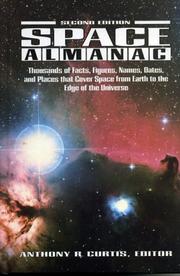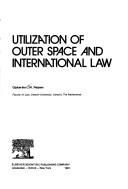| Listing 1 - 10 of 58 | << page >> |
Sort by
|
Book
ISBN: 9781498583114 Year: 2020 Publisher: Lanham, MD : Lexington Books,
Abstract | Keywords | Export | Availability | Bookmark
 Loading...
Loading...Choose an application
- Reference Manager
- EndNote
- RefWorks (Direct export to RefWorks)
With a focus on China, the United States, and India, this book examines the ambitions of the second space race. The authors explain how international competition, strategic culture, and elite preferences influence the development of national space programs, policy, and law.
Book
ISBN: 2707117269 9782707117267 Year: 1987 Publisher: Paris : Editions La Découverte,
Abstract | Keywords | Export | Availability | Bookmark
 Loading...
Loading...Choose an application
- Reference Manager
- EndNote
- RefWorks (Direct export to RefWorks)
Outer space --- Exploration --- Fiction --- Outer space - Exploration - Fiction

ISBN: 0884150399 Year: 1992 Publisher: Gulf Publishing Company Huston
Abstract | Keywords | Export | Availability | Bookmark
 Loading...
Loading...Choose an application
- Reference Manager
- EndNote
- RefWorks (Direct export to RefWorks)
Artificial satellites --- Rockets (Aeronautics) --- Solar system --- Outer space - Exploration.
Book
ISSN: 02501589 ISBN: 9290920319 9789290920311 Year: 1990 Volume: 63 Publisher: Paris ESA
Abstract | Keywords | Export | Availability | Bookmark
 Loading...
Loading...Choose an application
- Reference Manager
- EndNote
- RefWorks (Direct export to RefWorks)
Outer space --- Exploration --- Economic aspects --- -Exploration --- -Economic aspects --- -Outer space --- Outer space - Exploration - Economic aspects - Europe

ISBN: 0444419659 9780444419651 Year: 1981 Publisher: Amsterdam : Elsevier,
Abstract | Keywords | Export | Availability | Bookmark
 Loading...
Loading...Choose an application
- Reference Manager
- EndNote
- RefWorks (Direct export to RefWorks)
Space law --- Airspace (International law) --- Outer space --- Exploration --- Space law. --- Airspace (International law). --- Outer space - Exploration
Book
ISBN: 9780190903343 Year: 2020 Publisher: Oxford, UK : Oxford University Press,
Abstract | Keywords | Export | Availability | Bookmark
 Loading...
Loading...Choose an application
- Reference Manager
- EndNote
- RefWorks (Direct export to RefWorks)
This book is the first work to assess the full impacts of space expansion, past, present and future. Thinking about space, and the visions fervently promoted by the global space movement, are dominated by geographic misperceptions and utopian illusions. The parts of space where almost all activity has occurred are part of the planet Earth, its astrosphere, and are, in practical terms, smaller than the atmosphere. Contrary to frontier visions, orbital space is already congested and degraded with dangerous space debris. The largest impact of actual space activities is an increased likelihood of catastrophic nuclear war stemming from the use of orbital space and space technology to lob nuclear weapons at intercontinental distances. Building large-scale orbital infrastructures will probably require or produce world government. The ultimate goal of space advocates, the colonization of Mars and asteroids, is promoted to guarantee the survival of humanity if major catastrophes strike Earth. But the spread of humanity into a multi-planet species will likely produce an interstate anarchy highly prone to total war, with Earth having many disadvantages. Altering the orbits of asteroids, a readily achievable technology vital for space colonization, also makes possible 'planetoid bombs' with destructive potentials millions of times great than all nuclear weapons. The biological diversification of humanity into multiple species, anticipated by space advocates, will further stoke interworld wars. Astrocide - the extinction of humanity resulting from significant space expansion - must join the lengthening list of potential threats to human survival. Large-scale space expansion should be relinquished in favour of an Earth-oriented space program of arms control and planetary security.
OUTER SPACE--STRATEGIC ASPECTS --- OUTER SPACE--EXPLORATION --- OUTER SPACE--CIVILIAN USE --- SPACE WARFARE --- GEOPOLITICS
Book
ISSN: 03796566 ISBN: 9290920971 9789290920977 Year: 1994 Volume: 1169 Publisher: Paris ESA
Abstract | Keywords | Export | Availability | Bookmark
 Loading...
Loading...Choose an application
- Reference Manager
- EndNote
- RefWorks (Direct export to RefWorks)
Scientific satellites. --- European Space Agency. --- Hubble Space Telescope (Spacecraft) --- Outer space --- Exploration. --- 52 --- #TWER:WTCM --- Astronomie. Astrofysica. Ruimteonderzoek. Geodesie --- Outer space - Exploration.
Book
ISSN: 03796566 ISBN: 929092053X 9789290920533 Year: 1992 Volume: 1154 Publisher: Paris ESA
Abstract | Keywords | Export | Availability | Bookmark
 Loading...
Loading...Choose an application
- Reference Manager
- EndNote
- RefWorks (Direct export to RefWorks)
Scientific satellites --- Congresses --- European Space Agency --- Outer space --- Exploration --- 52 --- #TWER:WTCM --- Astronomie. Astrofysica. Ruimteonderzoek. Geodesie --- Scientific satellites - Congresses --- Outer space - Exploration - Congresses
Book
ISSN: 03796566 ISBN: 9290929898 9789290929895 Year: 2004 Volume: 1276 Publisher: Noordwijk ESA
Abstract | Keywords | Export | Availability | Bookmark
 Loading...
Loading...Choose an application
- Reference Manager
- EndNote
- RefWorks (Direct export to RefWorks)
Scientific satellites --- Outer space --- Exploration --- European Space Agency --- ESA --- Water-supply --- Water resources development --- Environmental aspects --- Scientific satellites - Congresses --- Outer space - Exploration - Congresses
Book
ISSN: 03796566 ISBN: 9290920327 9789290920328 Year: 1990 Volume: 1115
Abstract | Keywords | Export | Availability | Bookmark
 Loading...
Loading...Choose an application
- Reference Manager
- EndNote
- RefWorks (Direct export to RefWorks)
Astronautics --- -Outer space --- -Space sciences --- Aeronautics --- Astrodynamics --- Space flight --- Space vehicles --- Congresses --- Exploration --- -Congresses --- Outer space --- Congresses. --- Astronautics - Congresses. --- Outer space - Exploration - Congresses.
| Listing 1 - 10 of 58 | << page >> |
Sort by
|

 Search
Search Feedback
Feedback About UniCat
About UniCat  Help
Help News
News